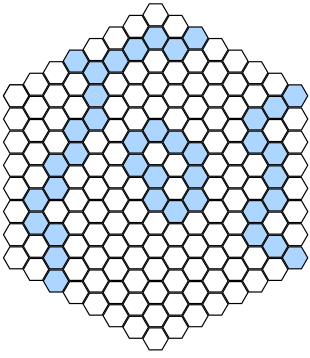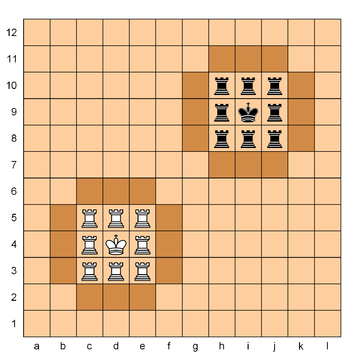Christian Freeling
| Christian Freeling | |
|---|---|
 Christian Freeling | |
| Born |
1 February 1947 Enschede, the Netherlands |
| Nationality | Dutch |
| Occupation | Mathematics teacher (retired) |
| Known for | Game designer |
| Website | |
| http://mindsports.nl/ | |
Christian Freeling (born 1 February 1947 in Enschede, the Netherlands) is a Dutch game designer and inventor of abstract strategy games, notably Grand Chess, Havannah, Hexdame and Dameo.[1][2]
"Christian's games often embody a desire to get to the heart of the concepts used in abstract games. This is most clearly displayed by his minimalist chess variant, Chad, and his version of column checkers, Emergo." (Handscomb 2002 Spring:7)
Freeling's designs cover a range of game types. Several are endeavors to improve on established games that he concluded are flawed or limited in some way. Some introduce familiar game mechanics into uncommon settings. He regularly translates rules for his orthogonal board games to the hexagonal grid, resulting in new versions with altered properties – usually enhanced strategy and tactics options, and fewer draws.
Notable games
Grand Chess utilizes the same compound pieces[lower-alpha 1] as Capablanca Chess, but connects the rooks giving immediate freedom of movement and "yields the better game" (Schmittberger 1992:206). Internet Grand Chess World Championships have been held, and NOST[lower-alpha 2] sponsored yearly tournaments beginning in 1998.[3] A Grand Chess tournament in Yerevan in 1996 attracted 21 chess masters.[4]
Havannah, a connection game using hexagonal cells like Hex, offers subtler strategy and more varied tactics (Schmittberger 1992:116) (Handscomb 2002 Winter:cover). The game was published by Ravensburger in 1981 and marketed for ten years, winning critical acclaim. In 2002 Freeling offered a €1,000 prize for any computer program in ten years that could beat him in even one game in a 10-game match, believing the nature of Havannah makes the game difficult to program and best played by human strategic thinking. In October 2012, via Internet, a 10-game match was conducted between Freeling and three Havannah bots. Freeling won by +7−3=0, losing two games to Lajkonik (Poland) and one game to Castro (Canada).
Hexdame exactly translates international draughts rules to a hexagonal gameboard, increasing move options and tactics, and reducing draws.[lower-alpha 3] The World Draughts Federation (FMJD) has actively promoted Hexdame as an alternative to the 10×10 game.[5]
Dameo utilizes all 64 squares of the checkerboard and introduces linear movement of lines of men, similar to Epaminondas and Bushka, to speed play, enhance tactics and curtail draws. "Considerable work has already gone into analyzing Dameo, and some remarkable discoveries have been made in the area of endgame positions with just a few pieces left." (Handscomb 2002 Summer:1)
Personal life
On 13 May 2000 in Enschede, SE Fireworks exploded 120 meters from Freeling's home, killing 23, wounding 947 and destroying 400 houses including Freeling's. Although uninjured, all his possessions and game materials were lost in the tragedy.[6]
Freeling has three sons and one daughter. His son Demian invented Congo, a xiangqi variant, when almost eight years of age in 1982.
Games invented

Chess variants
- Chad (1979)
- Chakra (1980)
- Yari shogi (1981)
- Rotary (1981)
- Shakti (1982)
- Caïssa (1982)
- Loonybird (1983)
- Dragonfly (1983)
- Grand Chess (1984)
- Cyclix (2011)
- Knightfall (2015)
Connection games
- Havannah (1979)
- Pylyx (2011)
- Scware (2012)
- Inertia (2013)
- Multiplicity (2013)
- Query (2010)
- Rondo (early 1980s)
- Superstar (1982)
- YvY (2009 with David J. Bush)
Elimination games
- Bushka (1981)
- Hexdame (1979)
- Emergo and HexEmergo (1980 with Ed van Zon)
- Crossfire (early 1980s)
- Dameo (2000)
- Tinkertown Cemetery (2013)
- Medea (2013)
- Pit of Pillars (2013)
Territory games
- Symple (2010 with Benedikt Rosenau)
- Sygo (Chinese) (2010)
- Phalanx (1981)
- Mu (1982)
- Medusa (1981)
- Lotus (1981)
- Macbeth (1981)
- Dominions (1984)
- Square Off (1982)
- Triccs (2012)
- Io (2014)
Mancala variants
- MiniMancala (late 1970s)
- The Glass Bead Game (late 1970s)
Race games
- Trackgammon (pre 1976)
- Breakthrough (1982)
- Jump Sturdy (2010)
- Traxion (2013)
Others
- Hexade (1979)
- Mephisto (1979)
- Hanniball (2009 with Arty Sandler)
- Swish and Squeeze
- InSight (2010)
- Monkey Trap (2010)
- Grabber (2011)
References
Notes
- ↑ The marshall combines a chess rook and chess knight; the cardinal combines a bishop and knight.
- ↑ kNights Of the Square Table (NOST), a (now defunct) correspondence game club formed in 1960 by Bob Lauzon and Jim France, enjoyed several hundred active members (Pritchard 1994:210).
- ↑ Three kings defeat a solitary king in a Hexdame endgame, whereas four kings are required in international draughts.
Citations
- ↑ Dylan Loeb McClain (19 August 2007). "Giraffes, Viziers and Wizards: Variations on the Old Game". New York Times. Retrieved 2008-12-07.
- ↑ Handscomb (Spring 2002), p. 7.
- ↑ Gardner, Tony (Autumn 2000). "The Grand Chess Corner". Abstract Games (Carpe Diem Publishing) (3): 24. ISSN 1492-0492.
- ↑ Pritchard (2007), p. 124.
- ↑ Kok (2001), p. 21.
- ↑ Handscomb (Summer 2002), p. 10.
Bibliography
- Handscomb, Kerry, ed. (Spring 2002). Abstract Games (Carpe Diem Publishing) (9). ISSN 1492-0492. Missing or empty
|title=(help) - Handscomb, Kerry, ed. (Summer 2002). Abstract Games (Carpe Diem Publishing) (10). ISSN 1492-0492. Missing or empty
|title=(help) - Kok, Fred, ed. (Winter 2001). "Hexdame • A nice combination". Abstract Games (Carpe Diem Publishing) (8). ISSN 1492-0492.
- Pritchard, D. B. (1994). The Encyclopedia of Chess Variants. Games & Puzzles Publications. ISBN 0-9524142-0-1.
- Pritchard, D. B. (2007). Beasley, John, ed. The Classified Encyclopedia of Chess Variants. John Beasley. ISBN 978-0-9555168-0-1.
- Schmittberger, R. Wayne (1992). New Rules for Classic Games. Wiley. ISBN 978-0-471-53621-5.
External links
- Official website MindSports • The ArenA
- Official website MindSports • The Pit
- Christian Freeling's Grand Chess by Hans Bodlaender, The Chess Variant Pages
